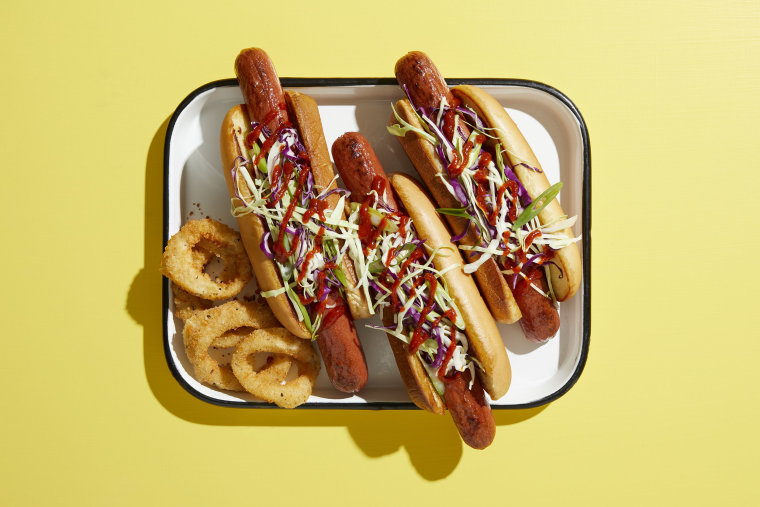Eating lots of ultra-processed foods may raise the risk of breast and ovarian cancer, a new study suggests.
An analysis of data from more than 197,000 adults from the U.K. who were followed for a median of nearly 10 years revealed that the risk of cancers and cancer-related deaths rose as the percentages of ultra-processed foods in a person’s diet increased, according to the report published in eClinicalMedicine.
“Our research suggests that cutting back on ultra-processed foods as part of lifestyle interventions may have important benefits on cancer risk,” says Dr. Eszter Vamos, the study’s lead author and a clinical senior lecturer at Imperial College London’s School of Public Health. “As eating ultra-processed foods is linked with a range of other poor health outcomes including obesity and Type 2 diabetes, it is important that people are aware of the health risks of consuming them in high levels.”
“This study adds to the rapidly growing evidence on the harmful effects of ultra-processed foods, and children are main consumers worldwide,” Vamos tells TODAY.com in an email. “While we are working on better understanding their effects on health and potential mechanisms, it is important we cut down on the consumption of ultra-processed foods in our diet to protect our and our children’s health.”
Experts tell TODAY.com that in the U.S., where people consume even higher amounts of ultra-processed foods, that there would likely be an even larger impact of ultra-processed foods on cancer risk.
What are ultra-processed foods?
These foods are ones that typically are labeled as “ready to eat or ready to heat,” says Jeanine Genkinger, an epidemiologist and associate professor at the Columbia University Mailman School of Public Health. “Typically, because they contain higher amounts of unhealthy fats, sugars and salt, they are tastier” to many people.
One clear sign that a product is ultra-processed is a very large number of ingredients — many with chemical names—listed on the label and multiple types of sugar and fat, Dr. Vijaya Surampudi, an assistant professor of medicine at the Center for Human Nutrition at the University of California, Los Angeles, tells TODAY.com. You might, for example, see sugars disguised by terms like “rice syrup,” she added.
To take a look at the impact of ultra-processed foods on cancer risk, Vamos and her colleagues turned to data from the UK Biobank, a large prospective study with over half a million participants who were aged 40 to 69 when they were recruited from England, Scotland and Wales between 2007 and 2010.
Among the 197,426 participants included in the researchers’ analysis were 15,921 who developed cancer and 4,009 who died from cancer.
Vamos and her colleagues found that for each 10% increase in the amount of ultra-processed foods in a person’s diet, there was a 2% increase in the risk of cancer overall and a 19% rise in the risk of ovarian cancer. There were similar increases in the risk of death from cancer: each 10% increase in the percentage of ultra-processed food in a person’s diet was associated with a 6% increase in the risk of overall cancer-related death, a 30% increase in the risk of death due to ovarian cancer and a 16% increase in the risk of death due to breast cancer.
The link between ultra-processed food and cancer might have been “much stronger,” if the study had been done in the U.S., Genkinger says. “On average, the U.K. participants’ diets included 23% ultra-processed foods,” she added. “Compare that to what we’ve seen in large U.S. data sources such as NHANES (National Health and Nutrition Examination Survey), which reports 54% to 57% ultra-processed food intake.”
While the new study can’t prove that the ultra-processed foods caused cancer, there’s mounting data suggesting that they are implicated in some way, Surampudi says. “It could be that higher consumption affects weight and decreases the opportunity for taking in other foods, such as fruits and vegetables, that supply nutrients the body needs,” she added.
It may just come down to the link between ultra-processed foods and obesity, Surampudi says. Other studies have suggested that people tend to consume more of these foods because they don’t lead to feelings of satiety.
“There are 13 types of cancer associated with being obese,” Surampudi says. “That’s more than any other risk factor.”
The new study “confirms the hypothesis we had that super processed foods could be carcinogens,” Dr. Emanuela Taioli, co-leader of the Cancer Prevention Program at the Tisch Cancer Institute at Mount Sinai in New York tells TODAY.com. Among the reasons researchers suspected ultra-processed foods might be linked to cancer risk is that they contain preservatives that “could be carcinogenic when you warm up the food,” Taioli says.
Moreover, some of the microwaveable packaging contains estrogen disrupters that can be released when products are heated, Taioli says. “That may be why we see more female cancers,” she says, adding that she hopes this report will spark more studies into possible mechanisms linking ultra-processed foods to ovarian and breast cancer.
Taioli suspects that when another five years pass, researchers may find more cancers overall and more types of cancer.
Opt for these foods instead
So how can busy Americans avoid ultra-processed foods, especially when fresh fruits and vegetables can be expensive and hard to find in some places?
“Frozen vegetables and fruits are considered to be more or less equivalent nutritionally to fresh,” Taioli says, adding that another strategy is to make large batches of food and then divide them into daily meal size and then freeze until they are needed.
People should expect that there will be days that you only have time to buy and microwave one of those prepared meals, Taioli says. “Cutting back is better than doing nothing,” she says.

